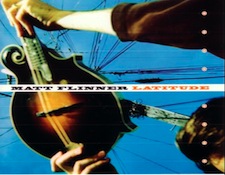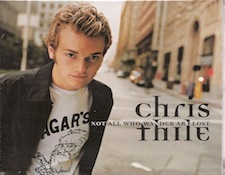It’s the time of year for saving money!
These two seminal acoustic jazz albums were released within a
month of each other in 2001. If you don’t already have them in your collection,
as usual, I’ve provided links to make their acqusition easier…
Compass Records

Matt Flinner is the kind of musician who has a historian’s attraction to traditional
musical forms and a jazzman’s love of improvisation. Latitude is Flinner’s latest attempt to reconcile these two
musically divergent influences. The results are eclectic and impressive. Unlike
many all-instrumental albums that degenerate into endless noodling, Flinner has
enough respect for the melody to keep the music well-grounded. All eleven
original compositions maintain a rustic feel while exploring new musical
territory.
Flinner is joined on his sophomore solo release by Todd
Phillips on bass, David Grier on guitar, Stuart Duncan and Darol Anger on
fiddle, and Jerry Douglas on dobro. Todd Phillips and David Grier have worked
with Flinner before on two trio albums, both of which have a similar
experimental acoustic jazz bent. Todd Phillips also handles the producer duties
on Latitude. Recorded at Monkey
Finger Studios in Nashville, Tennessee by Brent Truitt, and mastered by Randy
LeRoy at Final Stage in Nashville, the sound is intimate and close but not in
your face. Flinner’s Gilchrist mandolin sounds exactly as I remember it from
RockyGrass Academy last year.
If you like jazz combined with traditional acoustic music, Latitude will be right up your musical
alley.
Chris Thile – Not All Those Who Wander Are Lost
Sugar Hill Records

Even young prodigies eventually grow up. Mandolin whiz Chris
Thile has reached the ripe old age of 20 (now, in 2012, he’s 31), and he
shows no signs of narrowing down his ever-expanding musical horizons. His
latest, Not All Those Who Wander Are Lost,
is described by Bryan Sutton, one of the principle guitarists on the album, as
“modern acoustic/neo-chamber music.” Sounds about right to me. On this album
Thile determinedly expands our working definitions of both musical virtuosity
and melodic structure.
Unlike many virtuosos, whose music veers off into a netherworld
of technically challenging but musically vapid compositions, Thile’s tunes are
catchy. The opening number “Song for a Young Queen” (penned for Natalie
Portman) is infectious enough to winnow its way into your head and get stuck
there. “Club G.R.O.S.S”, the most hard-core jazz tune on the CD, still manages
to swing, with Jeff Coffin’s tenor sax trading “fours” with Chris. The award
for most rhythmically and melodically complex selection goes to “Riddles after
Dark”, a duet that features Bela Fleck’s banjo and Thile’s mandolin spiraling
and jousting through 3:24 of seemingly endless themes, variations, and
contrapuntal harmonies.
Joining Thile on Not All
Those Who Wander Are Lost are the A-list of acoustic sidemen. Stuart Duncan and Sara Watkins play fiddle,
Jerry Douglas is on dobro, Bryan Sutton and Sean Watkins handle guitar chores,
Bela Fleck is the banjoist, Edgar Meyer and Byron House perform bass duties,
and Jerry Coffin plays tenor sax for one song. Chris Thile not only composed
every tune on Not All Those Who Wander
Are Lost, but served as its producer as well. Gary Paczosa was both the
recording engineer and co-mixer along with Chris. Audiophile legend Doug Sax,
from The Mastering Lab, put on the finishing sonic touches. The sound is simply
impeccable.
My wife hates most jazz. Even the classics like “Kind of Blue”
leave her cold, but Not All Those Who
Wander Are Lost got both her thumbs up on first listen. Here is complex,
musically innovative music that is still euphonic and accessible. Not All Those Who Wander Are Lost is
among the most musically essential releases of 2001.





